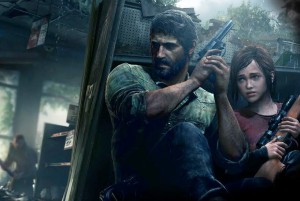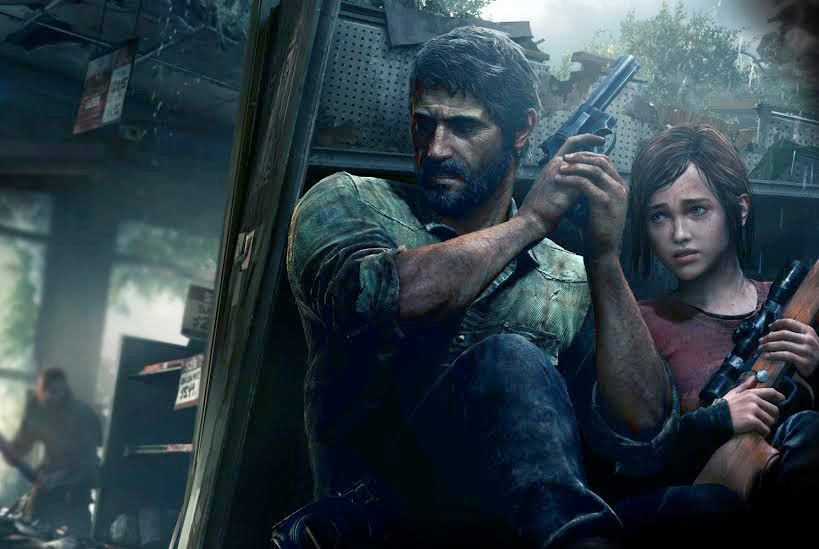Games make a play for legitimacy
Roger Ebert could not conceive of a world in which video games were considered art.
In response to a spirited online debate over his review of the 2005 film version of Doom, an admittedly brainless sci-fi shoot-‘em-up film starring Dwayne Johnson, the legendary film critic called out the entire medium: “To my knowledge, no one in or out of the field has ever been able to cite a game worthy of comparison with the great dramatists, poets, filmmakers, novelists and composers. That a game can aspire to artistic importance as a visual experience, I accept. But for most gamers, video games represent a loss of those precious hours we have available to make ourselves more cultured, civilized and empathetic.”

Last man standing · Joel (Troy Baker) and Ellie (Ashley Johnson) struggle to survive a world of post-human horrors in Naughty Dog’s The Last of Us, the latest video game to be optioned for a film adaptation. – Photo courtesy of Gamespot
Ebert’s argument, of course, hinges on how one defines art. Does art represent an imitation of nature, or a transcendence of it? Is it possible to interact with art, or can it only be observed? If a book, song or painting engages you on a deeply emotional level — moving you to tears, making you laugh hysterically or even frightening you enough to produce nightmares — is that enough to qualify that object as art? If we can’t settle on a working definition, perhaps the meaning of art is inherently subjective and should rest with the aesthetic judgment of the individual attempting to relate to it. Or maybe not. As the old saying goes, “There’s no accounting for taste.”
Modern video games are a unique medium because of their dual nature: They contain both gameplay mechanics and dramatic elements that allow players to act as emotional participants, analytical puzzle solvers, obsessive trophy winners or all of the above. Anyone attempting to champion a video game’s artistic merits, however, would do well to consider this question: Is your emotional attachment derived from the gameplay itself, or from the game’s cutscenes, which often boast superior production value and more cinematic storytelling? If it’s the latter, then what you’re responding to is a movie, not a video game.
One of the best examples of this phenomenon is the announcement trailer for Techland’s 2011 zombie shooter Dead Island. The three-minute teaser, which plays in reverse, opens with the violent demise of a child zombie who gradually reverts back to the little girl she once was, taking us to the final seconds before she’s mauled by a horde of ravenous ghouls. The non-linear nature of the sequence adds a tragic sense of inevitability to the horror on display.
YouTube was soon flooded with comments from viewers who proudly admitted to shedding tears while watching the video, with many saying they couldn’t believe they had been so affected by a video game. There were just a few problems: 1) The trailer featured no actual gameplay. 2) The doomed little girl and her family don’t appear in the finished game. 3) It wasn’t even animated by Techland, who farmed out the job to a Scottish studio called Axis Animation. The ad, which went on to win the Gold Award at the Cannes Lions International Festival of Creativity, succeeds as a beautifully composed short film but falls utterly short as an accurate depiction of the game itself.
Philosophical quibbles aside, there are a number of video games with legitimate claims to artistic merit. The first sign of the medium’s intent to mature was Shadow of the Colossus for Sony’s PlayStation 2, a very dark spin on the classic damsel in distress story that saw its young hero reduced to a horned monstrosity by the end of the final level. More recent examples include the cinema-quality mystery thriller Gone Home, the stark morality play Heavy Rain, the globetrotting serial adventure Uncharted, the immersive crime saga Grand Theft Auto V and the visually dazzling, thematically challenging BioShock series.
The industry’s breakthrough moment, however, arrived last summer in the form of Naughty Dog’s The Last of Us, a survivalist game that puts the player in control of the gun-toting Joel, portrayed by Troy Baker — the same voice actor who took over for Mark Hamill as The Joker in last year’s Batman: Arkham Origins. Joel is tasked with delivering Ellie, voiced and motion-captured by Ashley Johnson, into the protection of a resistance group who believes the young girl holds the key to curing the fungal infection that nearly wiped out humanity. Despite its familiar trappings — the comparisons to Cormac McCarthy’s book The Road are inescapable — the game emerged as both a commercial success and a critical darling, full of haunting visuals and rich, complex performances from Baker and Johnson.
Last week, Sony Pictures announced that it’s developing a big screen adaptation of The Last of Us. Screen Gems has picked up the distribution rights, and the film will be released under Sam Raimi’s Ghost House Pictures banner. Even though the game’s creative director, Neil Druckmann, is reportedly writing the script, many gamers are worried that a cinematic cash-grab will hurt the original’s reputation. Their concern is well-founded. From the profitable but mind-numbing Tomb Raider and Resident Evil franchises to full-blown catastrophes such as Max Payne and Prince of Persia: The Sands of Time, there hasn’t been a single quality motion picture based on a video game. Christophe Gans’ 2006 version of Silent Hill came the closest, but the film’s often-dodgy CGI threw off its creep factor.
Despite the stigma of video game adaptations, a few upcoming projects have the potential to reverse the curse. This month’s Need for Speed, starring Breaking Bad’s Aaron Paul and Dominic Cooper, looks like a premium cheddar action movie in the vein of the last two Fast and Furious flicks. Michael Fassbender, meanwhile, has been attached to Ubisoft’s Assassin’s Creed for a while now, and though the film hasn’t found a director yet, it’s already eyeing a 2015 release date. Director Duncan Jones, the ambitious young filmmaker behind Moon and Source Code, is busy prepping a movie version of the role-playing game Warcraft for March 2016. Gore Verbinski, the visual virtuoso behind Rango and the original Pirates of the Caribbean trilogy, was on the cusp of finally making his BioShock film, but The Lone Ranger’s dismal box office returns appear to have sunk that dream, at least for the time being.
So, how will The Last of Us translate to the big screen? Will the stories and characters fans fell in love with survive the jump into a non-interactive environment? Until the leads are cast and a director is announced, it’s hard to say. If the film does well, it will be considered a huge step forward, another milestone on the long and arduous road to artistic legitimacy. If it doesn’t, gamers everywhere will be left wishing for a real-life reset button.
Landon McDonald is a graduate student studying public relations. His column, “The Reel Deal,” runs Thursdays.

